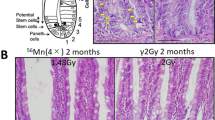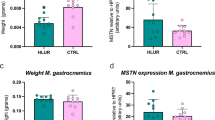Abstract
THE radio-protective effects of low oxygen tensions in tissues during exposure to X-rays has been described by Gray and his associates1. Wright and Howard-Flanders2 have demonstrated the protective action of severe hypoxia on the irradiated mouse-tail, and Wright3 has observed increased resistance of the intact mouse thymus, irradiated while the animal was breathing nitrogen.
This is a preview of subscription content, access via your institution
Access options
Subscribe to this journal
Receive 51 print issues and online access
$199.00 per year
only $3.90 per issue
Buy this article
- Purchase on Springer Link
- Instant access to full article PDF
Prices may be subject to local taxes which are calculated during checkout
Similar content being viewed by others
References
Gray, L. H., Conger, A. D., Ebert, M., Hornsey, S., and Scott, O. C. A., Brit. J. Radiol., 26, 638 (1953).
Wright, E. A., and Howard-Flanders, P., Acta Radiol., 48, 26 (1957).
Wright, E. A., Brit. J. Radiol., 32, 168 (1959).
Carter, R. E., Harris, P. S., and Brennan, J. T., Los Alamos Sci. Lab. Rep. LA-1075 (1950).
Author information
Authors and Affiliations
Rights and permissions
About this article
Cite this article
WEISS, L. Decrease in Radiosensitivity of the Intact Mouse Spleen produced by Hypoxia. Nature 184, 1156–1157 (1959). https://doi.org/10.1038/1841156b0
Issue Date:
DOI: https://doi.org/10.1038/1841156b0
This article is cited by
Comments
By submitting a comment you agree to abide by our Terms and Community Guidelines. If you find something abusive or that does not comply with our terms or guidelines please flag it as inappropriate.



